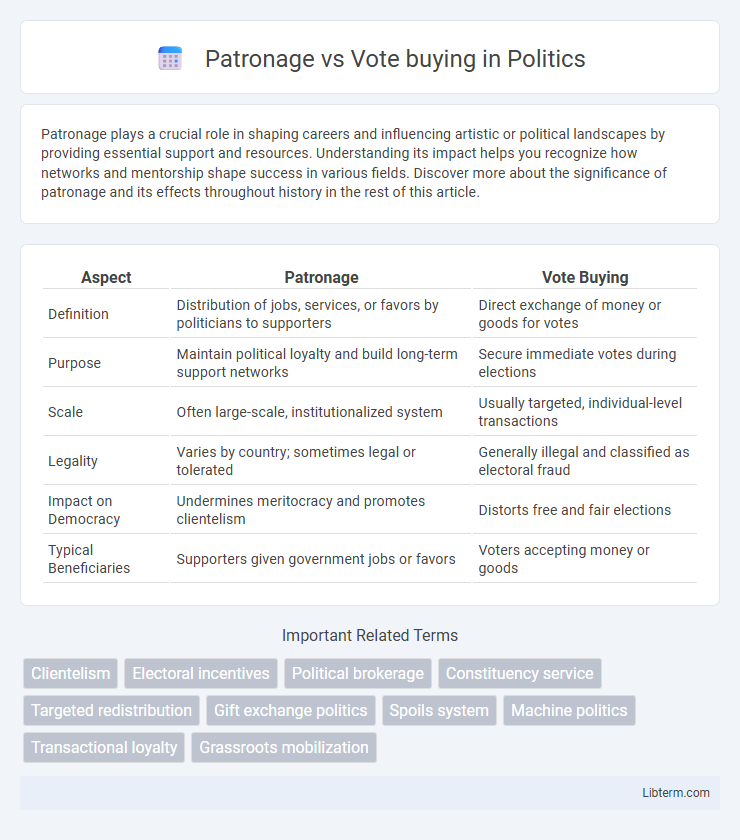Patronage plays a crucial role in shaping careers and influencing artistic or political landscapes by providing essential support and resources. Understanding its impact helps you recognize how networks and mentorship shape success in various fields. Discover more about the significance of patronage and its effects throughout history in the rest of this article.
Table of Comparison
| Aspect | Patronage | Vote Buying |
|---|---|---|
| Definition | Distribution of jobs, services, or favors by politicians to supporters | Direct exchange of money or goods for votes |
| Purpose | Maintain political loyalty and build long-term support networks | Secure immediate votes during elections |
| Scale | Often large-scale, institutionalized system | Usually targeted, individual-level transactions |
| Legality | Varies by country; sometimes legal or tolerated | Generally illegal and classified as electoral fraud |
| Impact on Democracy | Undermines meritocracy and promotes clientelism | Distorts free and fair elections |
| Typical Beneficiaries | Supporters given government jobs or favors | Voters accepting money or goods |
Understanding Patronage: Definition and Context
Patronage refers to the system where political support is exchanged for material benefits, such as jobs or services, fostering loyalty beyond formal electoral processes. It operates within a broader socio-political context, often reinforcing hierarchical relationships and control over resources. Unlike vote buying, which is a direct transaction for votes during elections, patronage involves ongoing reciprocal obligations between patrons and clients.
What is Vote Buying? Key Characteristics
Vote buying involves offering money, goods, or services directly to voters in exchange for their electoral support, often undermining democratic processes. It is characterized by immediate, transactional exchanges intended to influence voting behavior, typically lacking transparency and legality. Unlike patronage, which may involve longer-term relationships and broader political favors, vote buying is immediate and focused solely on securing votes in an election.
Historical Roots of Patronage and Vote Buying
Patronage and vote buying both have deep historical roots rooted in political systems where influence and loyalty were secured through material or social incentives. Patronage, dating back to ancient Rome, involved leaders granting favors, jobs, or privileges to supporters in exchange for political allegiance. Vote buying emerged as a direct transactional practice during the early development of electoral systems, notably in 18th and 19th-century democracies, where candidates offered money or goods to influence voters' choices.
Political Motivations Behind Patronage
Political motivations behind patronage primarily revolve around consolidating power and ensuring loyalty among supporters by distributing government resources or favors. Unlike vote buying, which seeks immediate electoral gains through direct exchanges of money or goods, patronage builds long-term political networks and hierarchical dependencies. This strategic allocation of resources strengthens clientelistic relationships, enabling politicians to maintain influence beyond election cycles.
Mechanisms of Vote Buying in Elections
Mechanisms of vote buying in elections involve direct or indirect exchanges where candidates offer goods, money, or services to voters in return for electoral support. This transactional approach contrasts with patronage, which is characterized by longer-term relationships where political favors and resources are allocated to supporters in exchange for loyalty. Vote buying typically leverages immediate material incentives to influence individual voting behavior, often undermining democratic processes and transparency.
Socioeconomic Factors Influencing Both Practices
Socioeconomic disparities significantly contribute to the persistence of patronage and vote buying, as impoverished communities often rely on material incentives for political support due to lack of access to education and economic opportunity. Limited social mobility and weak institutional frameworks enable political actors to exploit economic vulnerabilities through direct exchanges of goods or services for votes. These practices thrive in contexts where poverty, unemployment, and informal economies undermine democratic accountability and citizen empowerment.
Impacts on Democracy and Good Governance
Patronage undermines democracy by fostering dependency on political elites who allocate public resources in exchange for loyalty, weakening accountability and eroding institutional integrity. Vote buying distorts electoral processes by incentivizing short-term individual gains over collective policy considerations, leading to unrepresentative governance and corruption. Both practices degrade good governance by prioritizing personal or group interests above transparent decision-making and equitable resource distribution.
Legal Frameworks: Regulations and Enforcement
Legal frameworks addressing patronage and vote buying vary significantly across countries, with many establishing strict regulations to prevent electoral corruption and ensure fair democratic processes. Enforcement mechanisms often include electoral commissions empowered to investigate allegations, impose fines, and disqualify candidates engaging in vote buying or patronage abuses. Despite these regulations, challenges in monitoring and prosecuting such practices persist, necessitating stronger institutional capacity and transparency measures to uphold electoral integrity.
Case Studies: Global Perspectives on Patronage and Vote Buying
Case studies from Brazil reveal how patronage networks systematically exchange public resources for political loyalty, reinforcing clientelistic structures. In the Philippines, vote buying manifests through direct cash transfers and goods distribution during elections, undermining democratic processes and electoral integrity. Comparative analyses indicate that while both practices distort political accountability, patronage often embeds long-term dependency, whereas vote buying represents short-term transactional exchanges.
Strategies for Combating Corrupt Electoral Practices
Effective strategies for combating corrupt electoral practices such as patronage and vote buying include implementing stringent campaign finance regulations and enhancing transparency in political funding sources. Strengthening independent electoral commissions and enforcing severe legal penalties for offenders can deter attempts to manipulate voter behavior through illicit incentives. Civic education programs that raise public awareness about the detrimental effects of vote buying and patronage further empower voters to resist corruption and promote democratic integrity.
Patronage Infographic

 libterm.com
libterm.com